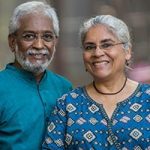



The fabric of the city emerged from the warp and weft of diverse threads, from the labour of migrant communities that made Bombay/Mumbai their own. The cotton mills and the proletariat that worked in them were central to the creation of the city. Through the poetry of Narayan Surve, the paintings of Sudhir Patwardhan, the music of the Shahir Amar Shaikh Cultural Troupe and the filmmakers’ images of a precarious yet resilient space, Saacha chronicles the changing life and times of a city that was once the hub of the working class movement in India. Weaving together poetry and paintings with memories of the city, the film explores the politics of representation, the relevance of art in the contemporary social milieu, the dilemmas of the left and the trade union movement and the changing face of a huge metropolis. Saacha, filmed in 2000, when the cotton textile industry was in the final stages of its decline, brings to bear an intimate and perceptive gaze on the lifeword of the mills and their workers, which has since been totally erased from the history and geography of the city.

Anjali Monteiro and K.P. Jayasankar are Professors at the School of Media and Cultural Studies, Tata Institute of Social Sciences, Mumbai.
Both of them are involved in media production, teaching and research. Their documentary films, which have been screened across the world, have won 32 national and international awards. A presiding thematic of much of their work has been a problematising of notions of self and the other, of normality and deviance, of the local and the global, through the exploration of diverse narratives and rituals.
They write in the broad areas of censorship, documentary film and media and cultural studies and have contributed to scholarly journals and edited volumes. Their most recent publication is A Fly in the Curry — Independent Documentary Film in India, Sage, 2016, which has won a Special Mention for the best book on cinema in the National Film Awards, 2016. They are both actively involved in movements against censorship including Vikalp, which is collective of documentary filmmakers campaigning for freedom of expression and are also associated with various media and voluntary organisations.
